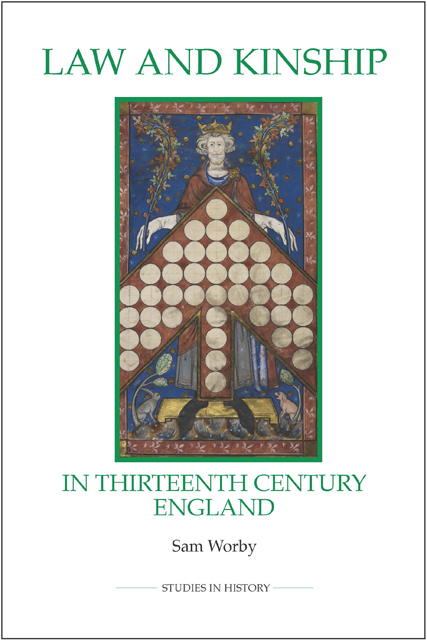Book contents
- Frontmatter
- Contents
- List of illustrations
- List of tables
- Acknowledgements
- Abbreviations
- Introduction
- 1 Canon law kinship structures
- 2 Common law kinship structures
- 3 The dominance of canon law kinship ideas
- 4 Kinship laws in practice
- 5 Trends underlying legal kinship structures
- Conclusion
- Appendices
- Bibliography
- Index
3 - The dominance of canon law kinship ideas
Published online by Cambridge University Press: 01 March 2023
- Frontmatter
- Contents
- List of illustrations
- List of tables
- Acknowledgements
- Abbreviations
- Introduction
- 1 Canon law kinship structures
- 2 Common law kinship structures
- 3 The dominance of canon law kinship ideas
- 4 Kinship laws in practice
- 5 Trends underlying legal kinship structures
- Conclusion
- Appendices
- Bibliography
- Index
Summary
Among the literate and learned, canon law concepts were foremost in thinking about kinship in thirteenth- and fourteenth-century England. This does not mean that the canon law was applied in legal contexts outside its remit. It was not applied or used where the parentelic system of common law kinship ought to have been employed. Rather, non-canonists turned to canon law ideas of kinship. The kinship of the canon law, in the form of ideas, arboresand treatises, was found more widely in such contexts than that of other systems (such as civil law kinship). Canon law kinship material can be seen in manuscripts other than the usual Decretumand decretals collections, or collections of canonist Summae . It can even be seen outside a university and clerical context, in the manuscripts of secular common lawyers. Knowledge of the canon law kinship system attained different levels of sophistication, and it was absorbed and integrated into people's thinking about kinship to different degrees. There is evidence of plain copying, of a patina of knowledge and awareness and, tellingly, of attempts to integrate more detailed canon law concepts with knowledge of other kinship and even to adapt canon law kinship into other contexts. This shows the dominance of the canon law as a general, common way of thinking about kinship structures.
Canon law kinship among common lawyers
The canon law kinship system was widespread and known among the learned including some common lawyers in thirteenth- and fourteenthcentury England. Several introductory treatises on canon law kinship and arboreswere copied into common law manuscripts in the first half of the fourteenth century. Such material occurred in approximately 10 per cent of surviving Bractonmanuscripts. While this figure is not large enough to posit a significant influence on common law kinship, it is large enough to reveal the importance of the canon law in conceptualising kinship generally.
There was no other body of extraneous material in Bractonmanuscripts quite like this group of canon law treatises and trees, although many Bractonmanuscripts contained ‘extraneous’ material. In his edition, George Woodbine listed fourteen manuscripts with notable additions, including four that contained consanguinity treatises.
- Type
- Chapter
- Information
- Law and Kinship in Thirteenth-Century England , pp. 68 - 91Publisher: Boydell & BrewerPrint publication year: 2010



